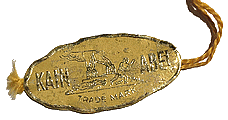The story of Cain and Abel and the first murder of human history – and the history of literature – is described in the fourth chapter of the Book of Genesis:
After the expulsion from paradise, Adam and Eve had two sons: the first-born Cain and his younger brother Abel. (Later, Eve had a third son; Set has nothing to do with this story, however.)
Cain became a farmer, and Abel a shepherd. One day they wanted to make a sacrifice to God. Abel, a very godly man, slaughtereded his best lamb and burned it on his sacrificial altar.
Although Cain was also a believer, he was more familiar with the work of his own hands. Accordingly, he did not take it very closely with the quality of his offerings. As a result, God accepted Abel’s sacrifice benevolently, but refused Cain’s. When Cain saw this, he became very angry. He called his brother back to the field and slew him.
When he became aware of his deed, he fled from the crime scene in panic. When he met God a short time later, He asked him: “Cain, where is your brother Abel?” Cain answered with a phrase that was taken over in our common parlance: “Am I my brother’s keeper?”
But of course God’s question was only meant rhetorical. He had observed Cain’s bloody deed and banished him – but not without branding him: the so-called Cain’s Mark was meant to let Cain be recognized as a murderer for all time. But on Cain’s supplication, God took it back from him later, so that Cain could establish a family. (By the way, one of his many grandchildren – Tubal-Cain – was appropriately the ancestor of the forgers.)
Cain and Abel in Emil Broch‘s picture mark
On the razors of the Kain-Abel Logo Edition, there is a drawing which, despite its small size, is highly detailed: Here you can see how Cain flees from the crime scene after the murder of his brother, while Abel lies dead on the ground.
In the background you can see the two sacrificing altars. As the smoke of Abel’s altar rises straight up to the sky, the smoke of Cain’s altar is immediately blown away from the wind. The purpose of this stylistic means is to make it clear that God is denying Cain’s offerings.

